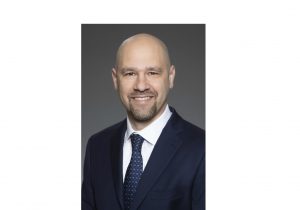By CorpGov Editorial Staff
Local, or last-mile, energy distribution infrastructure is essential for American consumers, providing access to reliable and affordable energy, particularly for heating and cooking. It also underpins America’s broader energy strategy, supporting economic stability through consistent, safe service at affordable cost.
Strategic capital market investments in pipelines and distribution networks that comprise essential energy infrastructure help prepare the system for a more resilient and more efficient future.
We sat down with Jason Zibarras and Hugh Au, a Director of Corning Energy, to discuss these topics further.
CorpGov : Would you please describe Corning Energy Corporation?
Jason Zibarras : Corning Energy Corporation is a utility holding company with three operating subsidiaries:
- Corning Natural Gas Corporation – a natural gas distribution utility serving approximately 15,000 customers in and around the Corning, New York area. Corning Gas is regulated by the New York State Public Service Commission.
- Pike County Light & Power Company – an electric and natural gas distribution utility with 5,300 electric customers and 1,400 gas customers in Pike County, Pennsylvania. Pike is regulated by the Pennsylvania Public Utility Commission (“PAPUC”).
- Leatherstocking Gas Company (“Leatherstocking”) – a gas distribution utility serving Susquehanna and Bradford Counties, Pennsylvania. Leatherstocking is the first new gas distribution utility in PA in over 40 years. Leatherstocking is also regulated by the PAPUC.
CorpGov : What is the background of Argo’s investment in Corning?
Jason Zibarras : Argo’s strategy is to invest in high-quality infrastructure businesses and assets that provide essential services to their communities and achieve sustainable investment returns over their long operational lives. In line with this, Argo’s interest in Corning was based on its solid fundamentals. Corning is an attractive business due to its high-quality asset base, strong management team, favorable customer demographics and track record in delivering high levels of customer service, safety and reliability. However, Corning, due to its reliance on short-term debt financing was facing liquidity constraints at the time of our initial investment.
Argo closed its purchase of Corning in July 2022; the transaction was valued at approximately $143 million. Argo’s strategic investment provided long-term capital to Corning’s three utility subsidiaries needed for increased investment in critical utility infrastructure, such as pipeline replacement, improving electric grid resiliency and continuing to meet customer service goals and safety.
 Jason Zibarras
Jason Zibarras
Managing Partner, Argo
CorpGov : Can you expand upon the liquidity constraints Corning was facing prior to Argo’s purchase?
Hugh Au: Due to its small size, Corning was reliant on local banks for debt financing. Unfortunately, the only debt financing offered by these smaller financial institutions was shorter-term, amortizing bank loans. The structure of these loans was problematic because it was a mismatch between Corning’s long-term asset life and its funding needs as compared to its then shorter-term sources of funding. This in turn forced Corning to issue a series of bank loans every year to refinance the maturing loans, exposing its customers to interest rate volatility. In addition, repaying the principal each year created a liquidity strain on the Company.
 Hugh Au
Hugh Au
Managing Director, Argo
Director of Corning Energy Corporation
How did Argo enhance Corning’s liquidity position?
Hugh Au : With over $2.3 billion of credit facilities and bonds across Argo’s portfolio of 18 investments, we have extensive banking relationships which we used to facilitate a comprehensive refinancing for Corning. All of Corning’s legacy amortizing bank loans were replaced by non-amortizing, long-term debt at fixed interest rates. In addition to reducing interest rate volatility and an annual risk cycle, Argo secured a sizable working capital facility as part of the refinancing, allowing Corning to fund growth and take advantage of supportive regulatory frameworks.
CorpGov : Can you provide some background on the regulatory environment that Corning operates in and why it is favorable?
Hugh Au: Each of Corning’s operating subsidiaries are regulated utilities. First, just a quick background on what it means to be a regulated utility. Regulated utilities provide essential public services, such as the delivery of natural gas, and typically have an exclusive right to serve customers in a specific geographic area; this avoids unnecessary duplication of infrastructure.
Since there is no direct competition, government regulators strive to ensure that the utility operates in the public interest by providing reliable service at a “just and reasonable cost”. Regulated utilities are permitted to earn a return on their capital deployed, referred to as the “rate base”.
Corning Gas, for example, has a multi-year rate order with the NYPSC that allows it to recover on a timely basis the capital spent on replacing leak-prone pipes to ensure a safe and reliable system.
Additionally, Pike has two PAPUC-approved long-term infrastructure improvement plans in place, one for cast iron and bare steel natural gas pipe replacement and the other for electric pole replacement and reconductoring. Pike is able to earn a return on these replacement projects through the PAPUC-approved rate riders without having to wait until the next rate case.
CorpGov : I see, so Argo’s investment allows Corning to invest, to better serve its customers, while earning its regulated return, correct?
Jason Zibarras : Yes, exactly. The improved capital Argo secured enables Corning to focus on safety and accelerate its growth opportunities, such as the leak-prone pipe replacement program allowed by the respective utility commissions, or the expansion of service to previously unserved or underserved areas. Population growth also bolsters the business. We are constantly looking for opportunities to invest and grow by strengthening and broadening the footprint of the businesses.
For instance, in the Pike service territory, Pike County, PA, outpaced US population growth by more than double from 2020 through 2024. A new hospital, along with associated medical buildings and facilities, is expected to be developed in the county, all of which will become Pike customers. The hospital will also attract new residential and commercial developments to the area, further increasing Pike’s customer count and rate base. All of this growth requires capital investment to support the community’s needs.
Similarly, Leatherstocking expanded its service to Wyalusing, PA in 2024 and will extend its natural gas operations to South Montrose and Harford Township in Pennsylvania in 2025, further substantiating the investment thesis of providing local, affordable natural gas from the Marcellus Shale to currently underserved or unserved customers.
In short, the comprehensive refinancing helped Corning take full advantage of its supportive regulatory environments and accelerate growth opportunities previously constrained by the Company’s liquidity.
CorpGov : Can you highlight the improvements at Corning since Argo acquired it?
Jason Zibarras : From day one we have been actively identifying enhancements. The Argo team, via the Company’s Board, has monthly meetings with Corning management to provide strategic and operational guidance and help monitor, focus and improve business performance. As one example, we leveraged Argo’s relationships in the insurance industry to secure better pricing and terms for Corning than previously available. For the right strategic opportunities, we are able to mobilize capital, whether that means partnering or Argo investing more equity into the business for “step-change” situations or supporting growth with equity and debt for more organic and incremental change.
Improving Corning’s liquidity and financial health has opened other investment opportunities.
CorpGov: Are there examples where Argo has done this already?
Hugh Au : Yes, in late 2023, Corning Gas partnered with Waga Energy, a renewable natural gas producer, on its first project at a landfill in the town of Bath, New York. This project cost more than $3 million and was an opportunity to invest in a non-fossil fuel clean energy project. Argo contributed equity into Corning to allow the completion of this project. The WAGA project has been a success for Corning.
CorpGov : How do you envisage the investment in Corning developing from here?
Jason Zibarras : We are well satisfied with the progress of our investment to date, and performance against our 2022 expectations has been very positive, as we’ve discussed. From here, we see a significant opportunity to grow the company through add-on acquisitions of similarly small or regional distribution utility networks. Principal targets are independent electric or gas distribution utilities in the Northeast or “orphan” utilities of larger parent companies – many major utility companies have disparate service territories, and some may have become non-core to their central business. Argo has capital to invest, and we have our eyes and ears open – Corning provides an excellent platform for investing high-quality utility companies, and we are very focused on helping Corning realize these opportunities.
Contact:
About Argo Infrastructure Partners
Argo Infrastructure Partners LP, founded by Jason Zibarras, is an independent fund manager with a long-term approach to infrastructure investing. Argo invests in high-quality infrastructure businesses and assets that provide essential services to their communities over their long operational lives, including investments in utilities, renewable energy, digital infrastructure, and other long duration infrastructure assets. Argo’s investment philosophy couples sound investment return with responsible and sustainable investing. As of January 2025, Argo manages over $6 billion in assets on behalf of its investor partners. For more information, visit www.argoip.com.







